Information Processing Model
- This model describes how the brain receives, records, and stores information.
- The brain inputs information through sensory organs that receive information from surroundings.
- The short-term memory holds information for a short period.
- Deep-rooted memory has limitless capacity.
- Resultantly, it holds details for discussing ideas and personal experiences.
This slide presents the main characteristics and features of the Information Processing Model. Information processing theory is a method of studying cognitive development that arose from the American experimental psychology tradition (Zheng & Gardner, 2019). Developmental psychologists use the information processing viewpoint to explain mental development in terms of maturational changes in essential components of a child’s mind.
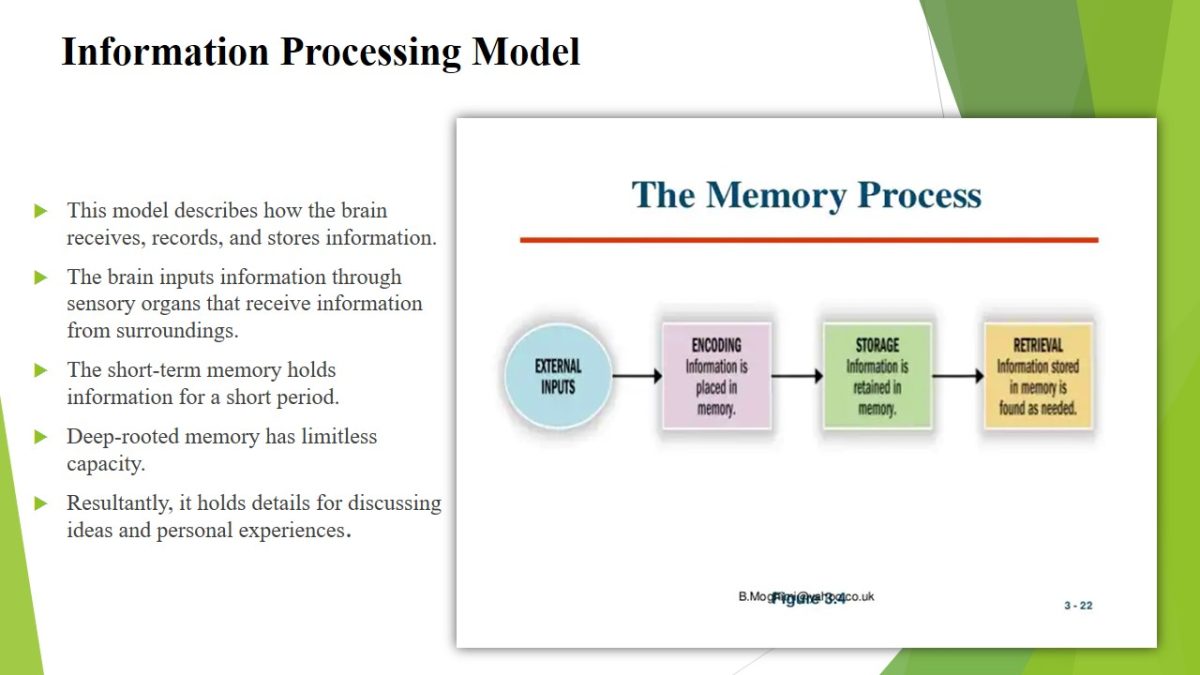
Evolution of Information Process
- Information processing is undergoing dramatic development.
- Previously, the brain processed information through a natural system.
- Computer invention has drastically changed information processing.
- The widespread use of computer has improved transportation of information.
This slide presents the main points that reflect the principle of changing the perception of information (Zheng & Gardner, 2019). This viewpoint compares the mind to a computer, which interprets data from the outside world. This hypothesis explains how childrens’ brains mature as they grow, resulting in improvements in their capacity to interpret and respond to information acquired via their senses.
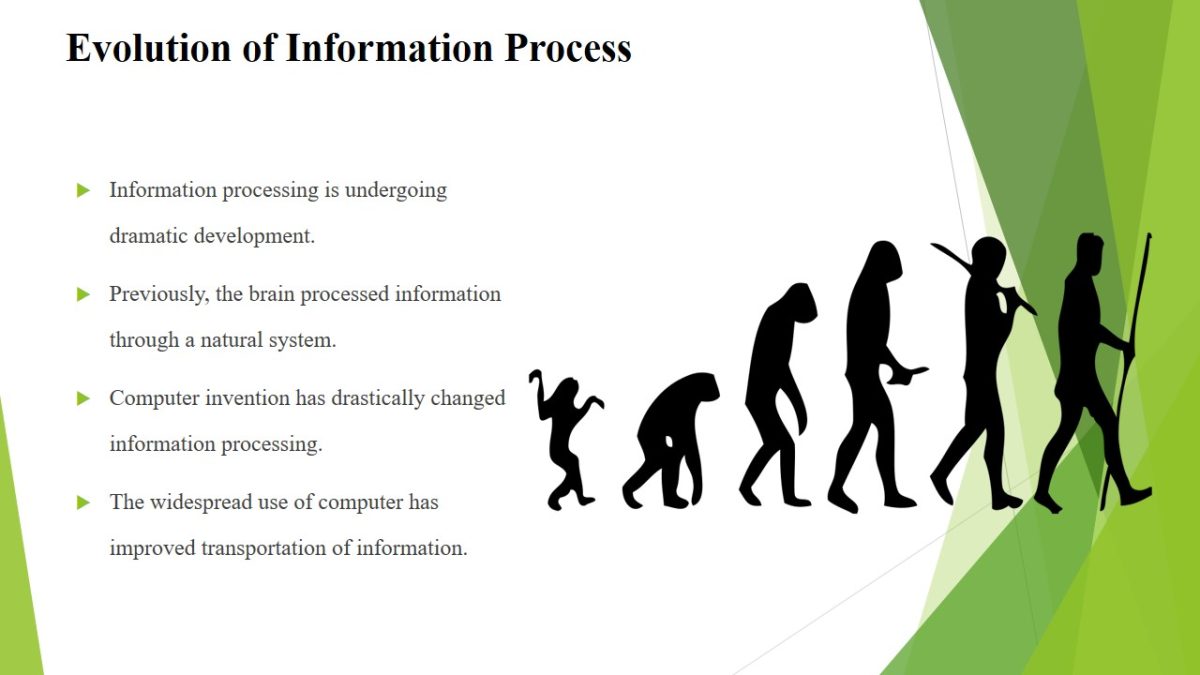
The Two–Track Mind
- The human brain processes information through two channels.
- The visual perception track forms instincts regarding the physical creation of the world.
- The sight action tract harmonizes physical shifting to interact with things that we see.
- Unconscious parallel processing helps to do routine activities with fairly less focus.
- Serial conscious processing is slower and needs concentration on one task at a time.
The two-track mind refers to the two minds that coexist within our single brain. The conscious and unconscious minds, to be precise. Let me begin by describing the two-track mind in this manner. You only have one brain where two minds are working in one brain at the same time. Those two minds are not always cooperating because they constantly feed off one other and exchange information (Mangelschots, 2021). However, because this information exchange occurs subconsciously, it may appear that both minds are working separately. The conscious mind’s decisions are well-thought-out and have a reduced mistake rate. This is because judgments and thinking processes are made intentionally over a more extended period of time. The unconscious mind has the benefit of making quick judgments based on intuition (our prior experiences) and requiring no awareness or conscious mental effort. Thus, there are two channels through which the brain processes information. The visual perception track forms instincts about the physical world, the sight action tract harmonizes physical displacement, allowing to interact with what we see (Wu et al., 2017). Hence unconscious parallel processing, unconscious work with information that does not require much effort, and serial conscious processing, slower, requiring attention and concentration.
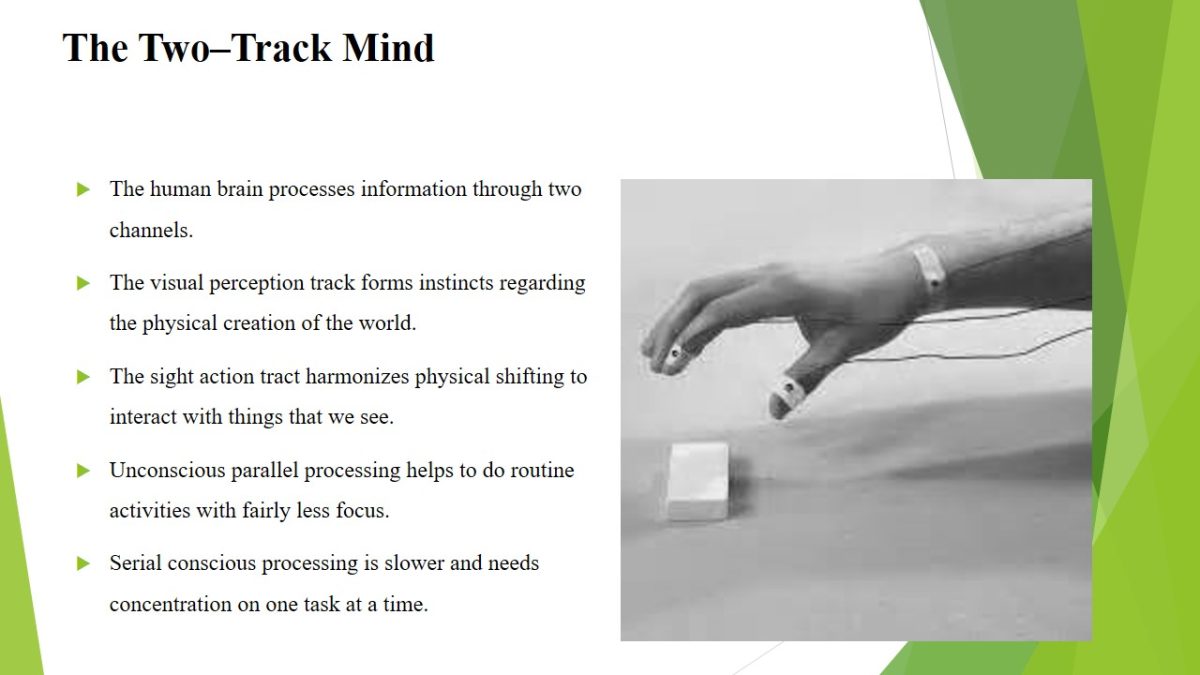
Implicit And Explicit Memory Systems
- Brain retains information through implicit and explicit memory systems.
- Implicit memory retains information in the brain unconsciously and automatically.
- This system typically affects how humans perform tasks.
- Explicit memory involves personal experiences and factual information used consciously and intentionally to recall.
Many people often get confused about different types of memory. There are short-term and long-term memory, which are divided into several different categories. Memory disorders can affect one or more aspects of short-term and long-term memory (Zheng & Gardner, 2019). When you are asked to define implicit memory, you can say that it is a long-term memory of what you do automatically every day, without conscious thinking. Explicitly defining memory is much easier. This type of memory is responsible for your long-term memories, for example, when you went on vacation last year. Explicit memory is extracted consciously, while implicit memory is extracted unconsciously as soon as a person begins to do something that requires memory extraction (Zheng & Gardner, 2019). An example is balancing a bicycle after a person has started riding. Implicit memory is used much more since it can be implemented even in states of immobility and can be implemented by anyone who has had previous personal experience corresponding to the definition of an entry in the implicit part of memory. Implicit memory helps older people because they can restore in their minds the familiar environment to which they are accustomed and their daily routine with age (Zheng & Gardner, 2019). This helps them in performing everyday tasks. However, it becomes challenging for them to survive in new conditions, such as nursing homes.
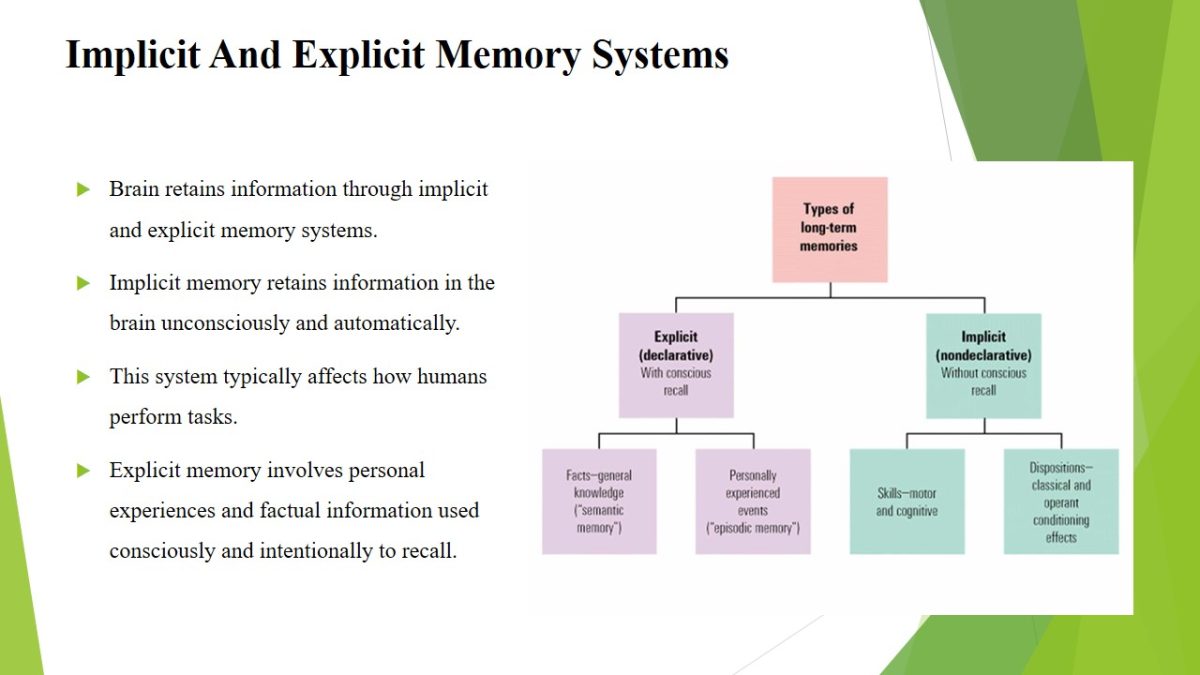
Impact of Synapse on Memory Processing
- Synapse level affects memory processing.
- Emotional states affect the ability to memorize details.
- The brain releases glucocorticoids hormones when stressed.
- These hormones affect encoding, recording, and recalling of information processing.
In the central nervous system, under the influence of learning, new synapses are formed, and their amount increases, the release of mediators in them rises, dendrites grow, the quantity of spines on them expands, as well as the number of axon collaterals. The termination of training leads to the disappearance of these phenomena within a month. So emotions and changes at the synapse level affect memory processing, and emotional states contribute to the memorization of details. What is more, special proteins are synthesized in neurons that stabilize synaptic processes. For example, if one eye of a newborn animal is closed for many weeks after birth, neurons in alternative strips of the visual cortex of the large brain (neurons normally associated with a closed eye) will degenerate, and the closed eye will remain partially or completely blind during later life.
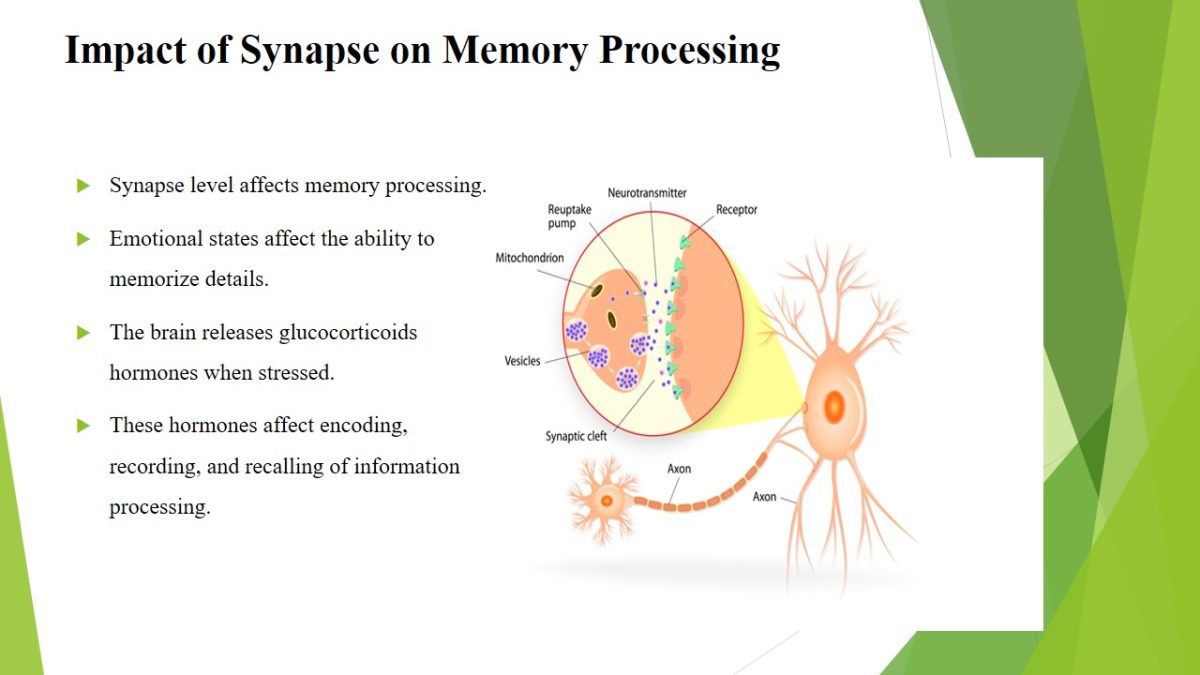
Improving Memory and Study Habits
- The human brain suffers memory loss due to aging and other biological reasons.
- Recent research suggests possible improvement approaches.
- High consumption of sugar-laden can cause memory loss.
- Taking supplements, such as fish oil, helps improve memory
- Obtaining enough rest can help in consolidating and transforming short-term memory into the long-term.
- Avoiding brain distraction boosts concentration.
- Focusing on one subject rather than multitasking helps improve study skills.
To make the most of your memorization skills, you need to be calm and attentive. The primary way to properly tune in to memorization is to get enough sleep. With the help of training, you help your body and brain to maintain the functions of all systems and organs at an optimal level (Zheng & Gardner, 2019). For memory development, it is necessary to maintain the thought process in an active state constantly. A lazy brain does not remember well.
Attention is extremely important for memory. Concentrate on remembering something. In the absence of attention, you will not be able to transfer short-term memories to long-term memory (Mangelschots, 2021). Do everything possible to increase your concentration. Try to focus on some activity, gradually increasing the duration. Do not do several tasks at the same time and do not jump from one activity to another.
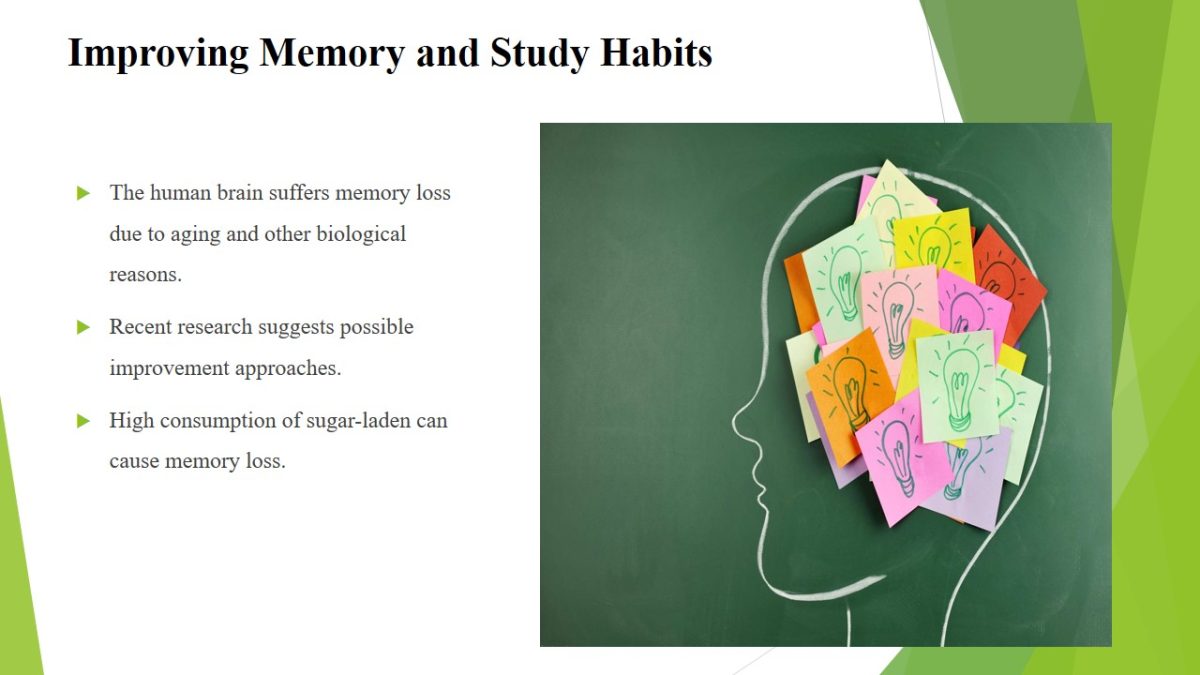
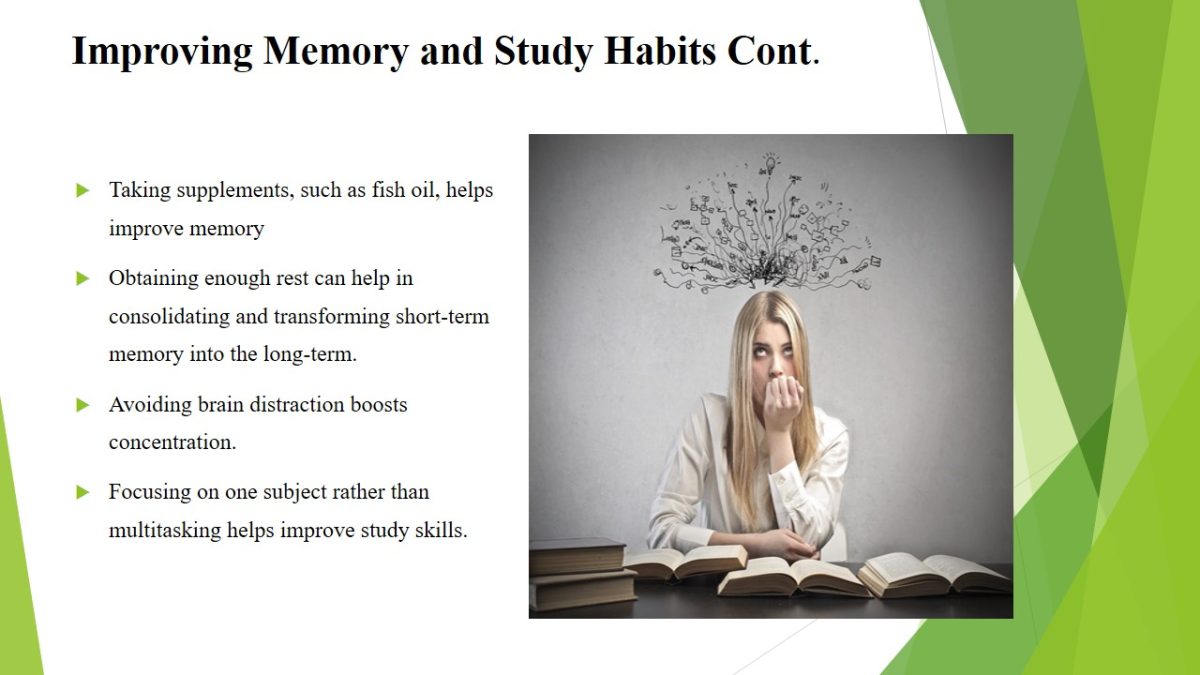
References
Zheng, R., & Gardner, M. (2019). Memory in Education. Routledge.
Mangelschots, K. (2021). The dual-track mind: How the conscious and unconsious mind work together. Healthybodyathome. Web.
Wu, H., Wang, X. H., Gao, B., Deng, N., Lu, Z., Haukness, B., … & Qian, H. (2017). Resistive random access memory for future information processing system. Proceedings of the IEEE, 105(9), 1770-1789.